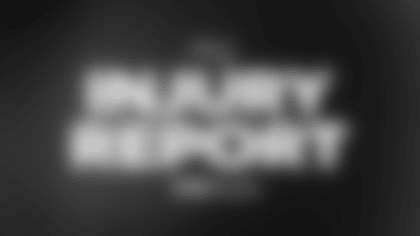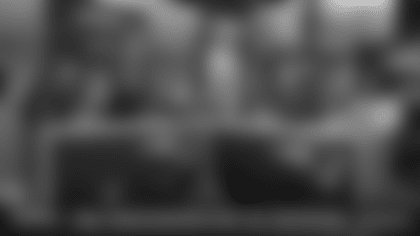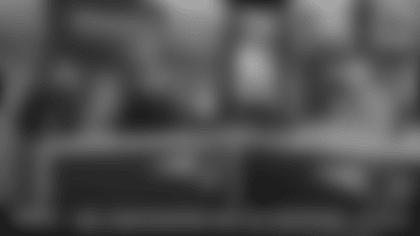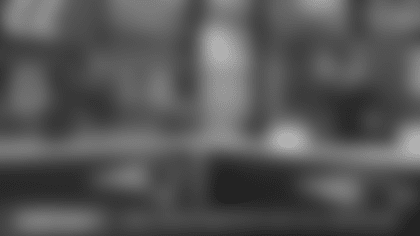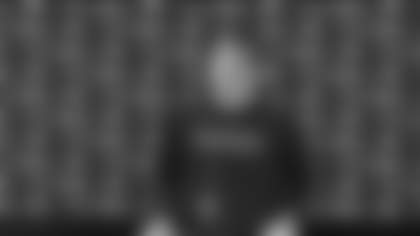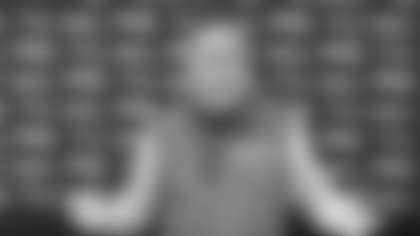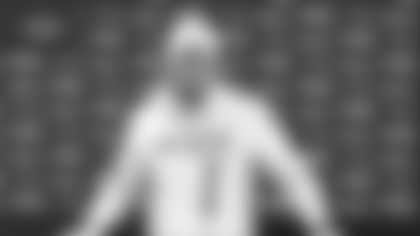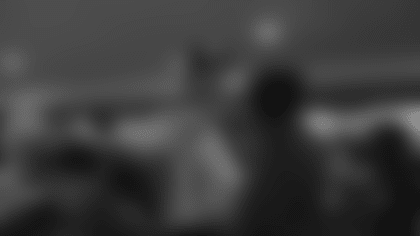[

]()
It is just like a regular season Friday for us. We will review and recap the week and try to tighten things up and get ready to go here on Sunday.
Q: Is there more game planning this week since it is more like a regular season game?
B: We talk a lot about game planning because it's our home opener. In terms of actually setting up game planning, not that extensively, but we definitely have some ideas about what we want to run in the opener. Things we've been saying like, 'let's not do it right now, but this would be a good idea down the road.'
Q: What can we expect to see in terms of first stringers?
B: We'll just have to see how it goes. I told them to be ready to play the whole game. That's what I told them from the first game. A quarter, a quarter and a half, three quarters, I don't know. We'll just have to see how it goes, but they should be ready to play.
Q: Have you gotten the chance to talk to Bruce Armstrong yet about his status and how he feels returning from injury?
B: No, I haven't. I talked to a few players about some other things, but I'll just have to catch up to him before practice.
Q: Defensively, are you concerned, happy, do you feel you need more bodies?
B: I think we can definitely play with what we have. If there was a way to improve any position on this team, I think we'd consider it. I wouldn't really exclude anything. If we really thought we could make an improvement, we would consider it.
Q: How is Brandon Mitchell progressing?
B: I think he is progressing. He's done a nice job since he's come back in the last two and a half to three weeks. He missed quite a bit of time there in camp. When he came back, he was a little bit behind some of the other guys on his techniques and reactions and all, but that seems to be improving. He's made good progress since he's been back on the field the last couple of weeks. He did okay against Washington last week, hopefully that will improve this week.
Q: Is he a guy you watched at New York?
B: We scouted him coming out of (Texas) A&M and then in all honesty watching him here, he wasn't in there all that much. The hand or wrist or whatever that was. We were kind of looking for him. Just the way the game sits sometimes, he wasn't always in there, but at times he was.
Q: What type caliber of a player is he?
B: I think Brandon has good ability. He runs well, he's athletic. He certainly has enough strength. He is a smart player. He lacks playing time and experience. Durability has been somewhat of a question. Even this year, it's been a couple weeks in training camp.
Q: Does he remind you of anyone you coached?
B: The player he reminds me the most of is Rob Burnett.
Q: Can you say why?
B: They look alike. They have a similar build. They are similar athletically. He just does. Facially they have a little bit of resemblance.
Q: Have any decisions been made about injured players such as Bruschi and Katzenmoyer?
B: No. Those still will pretty much go to game time. What we normally do in the season, we would take those players out and work them out and see exactly what they could do. Then we'd make a determination whether at 80 percent if we'd still like to play them, if there are some limitations, if they are 100 percent or at 80 percent. If the limitations are more than we want to play with that day then we inactivate them. We've already been doing that weekly with certain players and I think we'll just continue doing that even though we don't have to inactivate them, just to get into the routine of doing it and the players get used to it. We can get our system set up so we can do that.
Q: Does Coach Rehbein work with Bledsoe on fundamentals and footwork like Coach Palmer did when Bledsoe was younger?
B: Drew is the type of quarterback where if you wanted to find plays of him doing things well and doing things right, there are plenty of them. Some quarterbacks, even when they are effective, you can still look at it and say, 'yes, that was effective, but that is really not how you want to do it.' Like any player, even though there are a lot of good examples of fundamentals, techniques and footwork, there are also times when it could be better and there are things that need to be improved and need to be corrected. Not every play in the game, but maybe there was a play here or a situation there. Drew and I talked about that since training camp. We've gone over tapes and I've talked to him, I know Dick (Rehbein) has too. 'Here's the footwork example, and this is what I'm talking about. This is something that you need to address and here is an example of the same type of play. Here you've done it right one way and here's another time where you didn't do it the same way and it's something you need to be more conscious of.' It's really just making them more aware. It isn't like he hasn't done it or can't do it, it has to become a second nature thing. When he is out there, he's got to be ready to throw the ball. He can't be thinking about where's my left foot where's my right foot. He has to be a little bit more instinctive.
Q: How would you rate him overall as an eight-year veteran on those aspects?
B: He's well above average.
[

]()
**Q: How do you get it to become second nature, by going over it in practice?**
B: Yes. Again, it doesn't need to be just about the quarterback position. It could go to any position. It could go to Ty Law at corner. It could go to anybody. It could go to Terry Glenn at receiver, you can pick out anyone that you want. There are certain things that you want players to be conscience of, particularly for each individual. Some things are going to be a better reminder for Terry Glenn than they would be for Troy Brown, some things for Bledsoe and maybe some other things for Tedy Bruschi. That's just the nature of each individual playing the position and their characteristics. For them to be better, those things need to be better.
Q: Is it easier for players who are young to be taught new techniques than veterans?
B: The only way I can answer that is it depends on the player. Everson Walls, played for 12 or 13 years in Dallas, came to us at the Giants, played corner, played safety. He had to do a lot of things at New York that he never did at Dallas. He was a very adaptable player. He still had a certain style of play, don't get me wrong. We asked him to do things that he'd never done in his career and was very effective doing them. There are other players you get as a rookie and you try to teach them things that are new just because they are young and they have a real problem with them. Other players adapt to it more quickly. I didn't coach him when he came in, but I don't think just because a player is young, he adapts quickly and just because he's old that it is hard to change him. Drew is a pretty adaptable player. He's a smart player and he understands what you tell him. It is more of an awareness thing. Antwan Harris is an example. We were just talking about it yesterday after practice. I've been trying to get, and Eric (Mangini) and DeWayne, (Walker), we've been trying to get him to do things a certain way for the whole training camp. It's been very frustrating on this one particular thing that he just hasn't been able to get it right. Finally in the last two days we're just starting to see that it's finally getting straightened out. Why it didn't happen four weeks ago and why it happened now as opposed to never, I don't know. We sat there and had this exact conversation yesterday in my office. The next thing we need to get corrected can't take this long. It took too long to get this problem clarified. We had a problem with two of our inside linebackers. On this one particular play, we read it wrong. We read it wrong in the Washington game and then we read it wrong in practice at the end of the week here. It was the same type of thing. I said, 'look, either you get this right or someone else is going to play here if you can't read this play properly.' As it turned out, the fist tape we put on that day, a linebacker from another team that played Tampa, read the play exactly the way we wanted it done. There's that guy doing it. Sometimes it just takes longer than it should. Why it takes three weeks instead of one, why it takes a year instead of half a year and why it takes a day instead of two months, I can't really explain it. It depends on the individual and what you want them to do, but when you go into training camp, I've done it every year I've been coaching, I make up a schedule. July 18th they're going to work on this. On July 19th they're going to work on that, on July 20th they are going to work on something else and you go right down the line. When you go down the fourth or fifth day of training camp and every year it's the same thing. We just aren't ready to do this. Over here, this doesn't seem to be a problem and we can go a little bit faster in the next area. If you look back at the last three, four or five years of putting this stuff in training camp, it's not like this is my first year of training camp. You know the schedule you are used to being on. Every year it changes and you have to adjust it because your team just doesn't go at the same rate as whatever you consider your normal rate. Based on experience you are either ahead of it or behind it in certain areas, and I can't tell you exactly why that is. We can go out, call it today and run it, but we know we are not going to have it right. We're going to have to correct it, we're going to have to run it again a second time. We're going to have to run it again a third time. Sometimes after the second time for whatever reason, you have it. Sometimes the tenth time, you still don't have it. Sometime that leads to laps around the field, sometimes that leads to six o'clock meetings. Sometimes you've really got to make a point as to where to draw the line here. We've got to get this. I really can't sit here and tell you why it's one way with one player or another way with another player, or even the same player with two different things. One thing comes to him like that and some things take longer.


